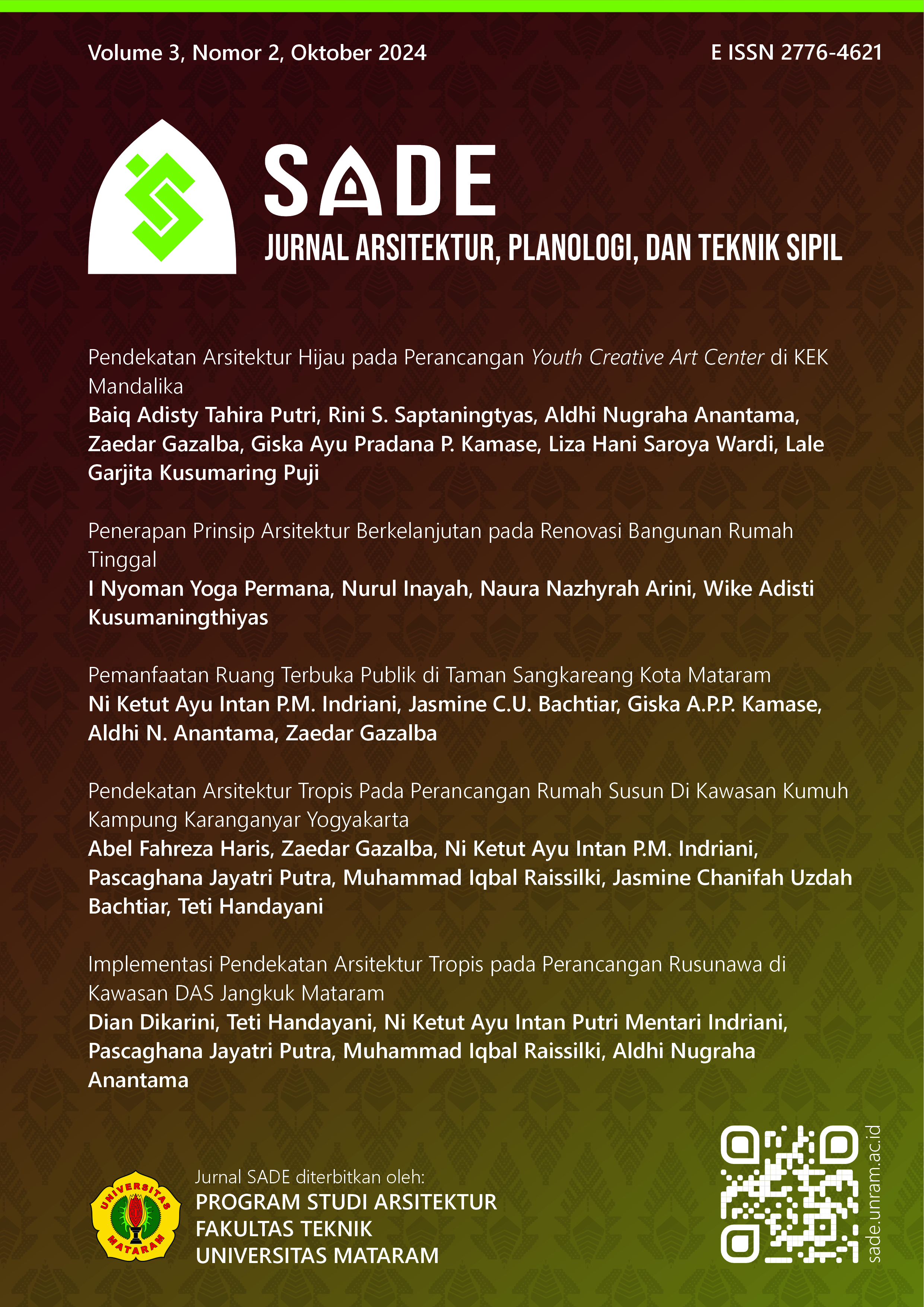GREEN ARCHITECTURE APPROACH IN THE DESIGN OF YOUTH CREATIVE ART CENTER IN KEK MANDALIKA
Integrating Sustainable Design Principles in the Youth Creative Art Center at KEK Mandalika
DOI:
https://doi.org/10.29303/sade.v3i2.87Keywords:
green architecture, art center, sustainable, creative, tourismAbstract
Green architecture is a concept that emphasizes the use of natural resources over artificial ones. This approach highlights the importance of awareness regarding the continuous reliance on non-renewable energy sources, which can have negative impacts on both humans and the buildings themselves. Green architecture is closely linked to sustainability, which involves reducing the use of non-renewable energy to prevent depletion and creating a more positive impact for future generations (Afifah, 2018). The aim of this writing is to formulate solutions to mitigate the negative effects of development on the environment, while also fostering the advancement of youth, artists, and tourism infrastructure in the international Special Economic Zone (SEZ) of Mandalika. The methodology used in this study includes identifying potential issues, conducting literature reviews, and examining the principles of green architecture. By applying these principles, the Youth Creative Art Center is expected to serve as a centralized facility for hosting various artistic and cultural activities, both domestically and internationally.
Keywords: green architecture; art center; sustainable; creative; tourism
References
Afrizal, Z. (2017). Kajian Arsitektur Hijau Dalam Pengembangan Desain Gedung Pemerintahan. ATRIUM, 3(2) 113-134.
Devina Ancilla, S. M. (2016). Perancangan Interior Arts Center dengan Pendekatan Ruang Fleksibel. INTRA.
Fajriana, S. F. (2021). Gedung Pertunjukan Seni di Pontianak dengan Pendekatan Kearifan Lokal.
Handoko, R. (2018). Desain Interior Galeri Seni dan Budaya Nusantara Surabaya dengan Konsep Modern Heritage Guna Meningkatkan Minat Masyarakat Akan Seni dan Kebudayaan Nusantara.
Hariananda, S. E. (2016). Semarang Central Library.
Kabupaten Lombok Tengah. 2016. Peraturan Bupati Lombok Tengah Nomor 64a Tahun 2016 tentang Rencana Induk Pembangunan Kepariwisataan Daerah. Kabupaten Lombok Tengah. 2016. Peraturan Daerah Kabupaten Lombok Tengah Nomor 2 Tahun 2016 tentang Rencana Pembangunan Jangka Menengah Daerah Kabupaten Lombok Tengah Tahun 2016-2021.
Lestari AAA, (2020). Kebijakan Pemerintah Indonesia Dalam Pengembangan Pariwisata. Jurnal Hukum Saraswati, 2(2).
Maulana, M. F. (2015). Pusat Kesenian Kontemporer Jakarta. [Tugas Akhir, Institut Teknologi Bandung]. Digital Library (Digilib) ITB.
Nurul H., Lalu W. K., Maya A. K., (2021). Respon Kultural Pemuda Terhadap Pengembangan Kawasan Wisata Mandalika di Desa Kuta Lombok Tengah. RCS Journal, Vol 1/1, 220-240.
Pemerintah Indonesia. 2009. Undang-Undang No. 10 Tahun 2009 tentang Kepariwisataan. Sekretariat Jenderal DPR RI.
Putri, F. M (2019). Perancangan Taman Budaya Sasak di Kuta Mandalika dengan Pendekatan Ikonik di Kabupaten Lombok Tengah. [Tugas Akhir, Universitas Katolik Soegijapranata]. Repositori Unika.
Rahanra, R. (2020). Pusat Seni dan Budaya di Kota Ambon, Maluku. Republik Indonesia. 2017.
Undang-Undang Republik Indonesia Nomor 5 Tahun 2017 tentang Pemajuan Kebudayaan. Sekretariat Jenderal DPR RI.
Downloads
Published
How to Cite
License
Copyright (c) 2024 Baiq Adisty Tahira Putri, Rini Srikus Saptaningtyas, Aldhi Nugraha Anantama, Zaedar Gazalba, Giska Ayu Pradana P Kamase, Liza Hani Saroya Wardi, Lale Garjita Kusumaring Puji

This work is licensed under a Creative Commons Attribution-ShareAlike 4.0 International License.
Hak cipta dan lisensi setiap artikel yang diterbitkan di situs jurnal dipegang penuh oleh penulis artikel dan tidak boleh disalahgunakan, dilipatgandakan, serta dipublikasikan diluar situs SADE untuk kepentingan tertentu tanpa persetujuan dari penulis.















